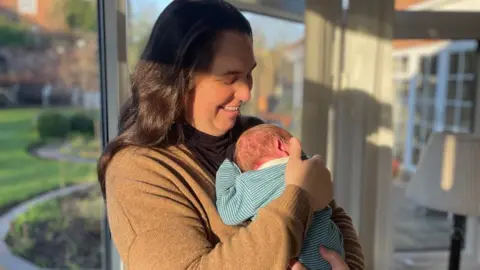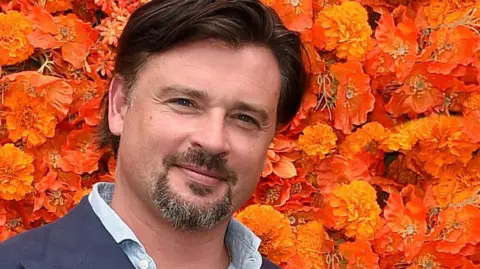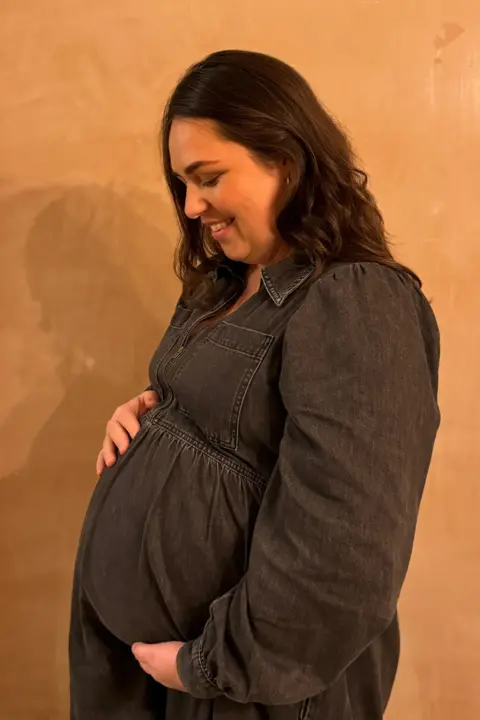'I realised, I can do this, I can have a baby solo'
 Amy
AmyThe moment Amy decided she was going to have a baby on her own, the tension she had been feeling started to disappear.
“I just realised - wait, I can do this. I felt instantly relaxed.
“Dating when you want a partner to start a family is quite intense.
“Now the relationship can come or not - but there isn’t this time pressure.”
Amy, 36, chose to use donor sperm and in-vitro fertilisation (IVF) - a route becoming increasingly popular with single women in the UK.
Like many other women, she grew up with the notion that she would get married and have children with a husband.
“When I was a young girl, I thought it was my only option - I thought that’s what life was.”
It was her father, who had been visiting her, who suggested she consider having a child solo.
Later, after two rounds of IVF, she was at his home in the Midlands when she found out she was pregnant.
And now, she is staying with her dad and stepmother for the first few months of her baby son's life.
'Really upsetting'
Amy, a lawyer from London, was forced to think about children after finding out she had a polyp in her womb - which could impact her chances of conceiving.
When she was 34, a doctor advised her to freeze her eggs.
“I went home in tears. The 13-year-old me thought that the 30-year-old me would have two children and be married. So the fact that I was 34 and freezing my eggs was really upsetting."
During the egg-freezing process, she started to listen to podcasts on fertility and began attending group coaching sessions.
With a reported shortage of sperm donors in the UK, Amy opted to look for donors in Denmark, which houses the largest sperm bank in the world.
She based her criteria on the same hair and eye colour as her own so that the baby would resemble her.
She then narrowed it down to six people before picking one, relying on intuition.
The sperm bank does not provide current photos, but Amy was able to see her donor’s baby photos and a celebrity lookalike - which was Tom Welling, a US actor best known for playing Clark Kent in the TV series Smallville.
 Getty Images
Getty ImagesAmy ordered several vials of sperm from the same donor in case she chooses to have another child. This donor’s sperm can be used to create 75 families around the world - with a limit per country.
“People ask me lots of questions, but I haven’t really thought about it since," she said.
“It’s interesting because I don’t talk about it with the other solo mums I’ve met - it doesn’t come up in conversation.”
 Amy
AmyPregnancy had its own difficulties, including hyperemesis, a condition which causes extreme vomiting and nausea.
During her first trimester, she was vomiting up to 15 times a day.
Almost bed-bound, Amy said she was lonely at times, and there were a couple of occasions when she missed having a partner.
“When my bump got too big, I couldn’t put my shoes and socks on, and another time when I found out how expensive nursery fees are."
In September 2023, a law changed in the UK giving people born using a sperm or egg donor in the UK the right to find out the identity of the biological parent.
It is something Amy would support - if her son wants to.
'Thousands of pounds'
The number of single women having treatment, including IVF, has increased from about 1,400 in 2012 to 4,800 in 2022, according to a report by the fertility regulator, the Human Fertilisation and Embryology Authority (HFEA).
It recommends that anybody using donor sperm should have treatment at an HFEA-licensed clinic because they are required by law to carry out rigorous health tests, as well as ensuring paperwork is in place.
They also offer everyone counselling.
The "astronomical" price of Amy's route might be enough to deter many women in a similar situation - freezing eggs, buying sperm and undergoing IVF are all expensive.
She estimates it has so far taken "tens and tens of thousands of pounds".
And that's before adding on the cost of childcare and nurseries.
Stigma surrounds the process of choosing to have a baby without a partner, according to solo parenthood coach Mel Johnson.
Ms Johnson founded her company, The Stork and I, to support women who are single and don’t want to miss out on parenthood.
“I’ve heard people say if you haven’t found a partner it's natural selection or some say it is detrimental for the child.
“But research shows it is the quality of the parenting that is most important, not the number of parents.”
Amy's son was born less than two weeks ago.
She said so far, motherhood had been "full on" but that she had received an incredible amount of support from her family and friends.
She is looking forward to the rest of her life as a mother.
Listen to the best of BBC Radio London on Sounds and follow BBC London on Facebook, X and Instagram. Send your story ideas to [email protected]
